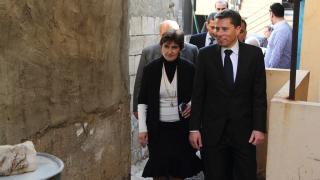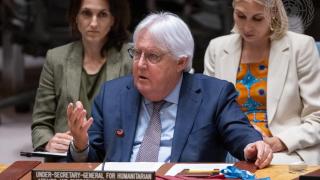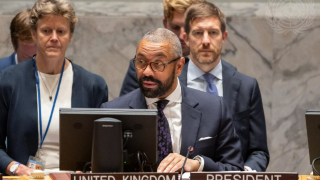
The Secretary-General has appointed Tom Fletcher as the next UN Emergency Relief Coordinator (ERC).
Fletcher has worked closely with the UN throughout his diplomatic career in Africa, the Middle East, and Europe and “has strong experience of leading and transforming organizations and bringing an understanding of diplomacy at the highest levels”.
UNA-UK welcomes the long awaited news of who is to succeed Martin Griffiths following his departure on 1 June. We wish Mr Fletcher well in taking up this vitally important post and look forward to supporting him and the efforts of the UN Office for the Coordination of Humanitarian Affairs (OCHA).
Without making a comment upon Mr Fletcher’s merit, we must note that this marks the sixth consecutive Briton to hold this position and we are concerned that the British monopoly of this role continues despite growing calls for this practice to end. It has been especially concerning to see reports that the appointment process appears to have been held up yet further in order to account for the change of administration in the UK.
While Joyce Msuya, Assistant Secretary-General for Humanitarian Affairs and Deputy Emergency Relief Coordinator, has by all accounts done an excellent job on an acting basis, the severity of humanitarian crises globally requires a permanent appointment. It is therefore concerning that there is still no formal indication of when Fletcher will be available to take up the post. Six months on from Griffiths’ announcement and four from his retirement, this is an unacceptable state of affairs.
In April this year, more than 60 eminent experts and leaders with experience working on humanitarian and international issues wrote to the UN Secretary-General urging for a transparent, inclusive and merit-based appointment process.
They noted that in the face of unprecedented humanitarian crises it would be “wrong to arbitrarily restrict the search for the next ERC to nationals of any one member state.”
Martin Griffiths himself stated that he hoped the UN would move in the direction of ensuring that he is the last British national to take the role, arguing that it is “too crucial a job to be left to favouritism”.
This is emblematic of the wider issue of senior roles being ‘ringfenced’ informally for nationals of permanent members (P5) of the UN Security Council. UNA-UK has long campaigned against this practice, which damages both the legitimacy of the UN as a global organisation with an independent international civil service, and also its performance through a failure to recruit for senior roles on merit. This in turn fuels ongoing resentments from many nations that the organisation only represents powerful states. This ongoing practice has long blighted the UN system and is in clear contravention of both the general provisions of the UN Charter and more than 15 specific decisions of the General Assembly, including Resolution 46/232 which states that no senior official should succeed an official of the same nationality into the same role.
More recently, the newly minted Pact for the Future - the major outcome document from last month’s Summit of the Future - explicitly stressed that “ there should be no monopoly on senior posts in the United Nations system by nationals of any State or group of States.” And while the UK is far from the only permanent member to enjoy a monopoly on a top job such as this, the continuing grip on the role of UN Relief Chief not only undermines the Pact but also appears to fly in the face of the Prime Minister’s recent, positive remarks to the UN General Assembly that the UK intends to change its approach on the global stage, to step up in a spirit of equal partnership and to champion a more representative international system.
There are undoubtedly talented British citizens who would perform well in senior roles. Indeed, UNA-UK is grateful to count many of them as advisors. However, we also understand there were a number of other highly qualified candidates and are concerned by the perception this will create that their candidacies were not given serious consideration - including those from states most affected by humanitarian operations.
This process was a missed opportunity for the Secretary-General to assert his independence and carry out the thorough selection that the world deserves, and likewise a missed opportunity for the UK to build on its role championing gender parity and fair power structures based on accountable, transparent institutions.
We hope that moving forward the UK will put words into action and support the international system by once again working to bring transparency and inclusivity to the upcoming selection process to find the next UN Secretary-General.
Read more:
-
Open letter to UN Secretary-General calls for merit-based appointment of Emergency Relief Coordinator
-
UNA-UK statement on Recruitment of UN Relief Chief putting ringfencing and UK’s record in spotlight
-
Read the Blue Smoke briefing: Ringfencing and the General Assembly
-
Read Martin Griffiths on the need to prevent favouritism in appointments
- See more from Blue Smoke
Photo: British Ambassador Tom Fletcher tours the Palestinian refugee camp in Dbayeh. March 2012. British Embassy Lebanon/Flickr






